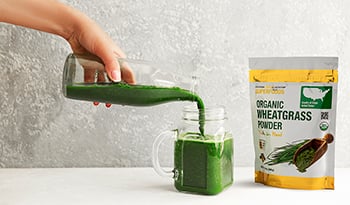How To Combat Stress and Anxiety With Foods Calming to the Nervous System

In today’s fast-paced world, stress and anxiety have become increasing problems. Estimates before the pandemic suggested that 3.6% of the world’s population was struggling with an anxiety disorder. Unfortunately, rates over the last few years have been increasing, with some research suggesting rates of anxiety may have tripled in certain populations.
Considering the number of individuals struggling with stress and anxiety, it’s worth exploring non-medication-based approaches that may be of benefit. Fortunately, research shows certain dietary patterns and foods may help to reduce the stress hormone cortisol and improve our stress response. These approaches to diet can have an overall calming or soothing effect on the nervous system.
As with many natural or integrative treatment approaches, it is worth noting that dietary strategies and foods may take time to provide their full benefits. As such, eating healthy more consistently will yield the best overall results when using dietary strategies and food to help counter or reduce stress.
Eating a Healthy Diet Overall
While probably the least exciting recommendation, eating a healthy diet overall is by far the most powerful. A diet that emphasizes plenty of fruits and vegetables, beans, and whole grains, with moderate consumption of healthy sources of animal protein, including seafood, poultry, and lean meat, is likely the best overall strategy. Eating healthy lays a solid foundation for health and provides more nutrients needed for the body and mind to function optimally.
Poor Diets Throughout the World: Ultra-Processed Food
Unfortunately, the standard American diet, which is being increasingly consumed even beyond the borders of America, focuses heavily on ultra-processed foods. Ultra-processed foods are foods that are transformed through industrial processes that often have additives to improve taste, appearance, or texture. Common examples of ultra-processed foods include soft drinks, packaged snacks, candy, ice cream, pastries, snack crackers, and even some types of bread. Ultra-processed foods often contain high amounts of sugar and other simple carbohydrates and are devoid of many micronutrients that can be important for maintaining mental health, including folate, vitamin B12, zinc, and others.
Worldwide data on ultra-processed food consumption is somewhat spotty but raises concerns. In the United States and the United Kingdom, over half of all calories are from ultra-processed foods. Other countries aren’t far behind. Some of the research suggests Malaysia, Japan, Australia, and Lebanon all have consumption levels of roughly around 40%.
Eating ultra-processed foods increases the risk for obesity, heart disease, diabetes, and other health conditions. As the risk for these conditions increases, so does belly fat. And belly fat is associated with increased cortisol production. As cortisol increases, the stress response can be heightened, potentially worsening our tolerance to stress.
This cycle is doubly damaging since increased cortisol increases hunger and calorie consumption, further increasing obesity and other health problems. To break the cycle, it’s necessary to improve the overall diet.
Foods That Can Help Calm the Nervous System
Beyond basic dietary strategies, some specific foods also stand out as to their potential benefits for helping to reduce stress and calm the nervous system. Most of these foods have been shown to help reduce cortisol levels if consumed as a regular part of the diet.
1. Probiotics and Probiotic Foods
Some of the strongest research on foods that affect cortisol and stress levels includes probiotics. While not consistent across all probiotics and in all studies, data still does suggest that probiotics and probiotic foods may help to improve stress tolerance, decrease anxiety, and reduce cortisol. A recent study found that probiotic supplementation in healthy adults reduced depression and anxiety while improving sleep. A separate study of college students found that probiotic supplementation could reduce test anxiety.
Considering the other potential benefits tied to probiotic consumption it makes sense to include probiotic and fermented foods to help calm the nervous system. Real sauerkraut, kefir, kombucha, kimchi, pickles, natto, tempeh, and miso are potentially fermented, although many store-bought varieties of pickles and sauerkraut are no longer produced through fermentation. Typically, fermented sauerkraut and pickles are found in the refrigerated section of the grocery store.
While also a fermented food, yogurt is often highly processed and loaded with sugar. If you tolerate dairy products, it’s best to get unsweetened varieties and add your own fruit.
2. Foods High in Omega-3 Fats
The brain, in large part, is made up of fat, and a significant percentage of these fats are omega-3 fatty acids. Omega-3 fats are more easily damaged than other fats, so it is essential to consume them regularly for a steady supply. Data on taking fish oil, a common source of omega-3 fats, suggests benefits for both depression and anxiety. While more data is needed, a recent meta-analysis concluded that fish oil may have a modest antidepressant benefit.
Studies for anxiety point to similar benefits. Another recent meta-analysis found that fish oil, especially in doses over two grams per day, appeared to improve anxiety disorders, reducing symptoms. A review of the potential anxiety-reducing mechanisms of fish oil found that anti-inflammatory effects, increases in brain-cell growth factors, reductions in cortisol and stress, and changes in heart-rate variability (suggesting a more relaxed mental-emotional state) were all plausible, although research is somewhat contradictory.
Consuming foods high in omega-3 fats, such as wild-caught fish, omega-3 rich eggs, or supplements with fish oil, could all help to improve mental health and soothe the nervous system. Plant sources of omega-3s, including walnuts, flax seeds, chia, hemp, and others, may also provide benefits, although data is stronger for the omega-3 fats found in fish and seafood.
3. Magnesium-Rich Foods
Magnesium is a key player in the stress response. Low magnesium levels worsen the symptoms of stress, and stress depletes magnesium. Therefore, if magnesium consumption is not maintained, the vicious circle between stress and magnesium can worsen magnesium status, aggravating stress levels. Considering that some estimates suggest up to half of people don’t consume enough magnesium on a daily basis, getting more magnesium is critical for improving stress and helping to calm the nervous system.
Magnesium can help reduce stress in several different ways: it helps muscles to relax and plays an inhibitory role in the neurotransmitter response to stress. Maintaining adequate magnesium, especially when stressed, is critical for helping to maintain a healthy stress response. Studies have found that psychological stress and symptoms often correlate with a low magnesium status. While the quality of evidence needs improvement, a recent meta-analysis did conclude that the evidence suggests magnesium is helpful for anxiety.
Foods high in magnesium include leafy greens, avocados, nuts and seeds, whole grains, and beans. Some particularly rich sources include dark chocolate, hemp seeds, almonds, and pumpkin seeds. Incorporating these foods regularly can increase magnesium consumption and help calm the nervous system.
Takeaway
Stress is a common problem. Fortunately, dietary strategies and certain key foods can help to improve stress resiliency and calm the nervous system. Eating a healthy diet that reduces or eliminates most processed foods is an important foundation. Adding probiotic foods, foods high in omega-3s, and foods rich in magnesium can all be beneficial as well. Using food appropriately, it is possible to help reduce stress and support overall health.
References:
- Boyle NB, Lawton C, Dye L. The effects of magnesium supplementation on subjective anxiety and stress-a systematic review. Nutrients. 2017;9(5):429. Published 2017 Apr 26. doi:10.3390/nu9050429
- Brett BE, Koko BK, Doumbia HOY, et al. Salivary biomarkers of stress and inflammation in first graders in Côte d'Ivoire: effects of a probiotic food intervention. Psychoneuroendocrinology. 2021;129:105255. doi:10.1016/j.psyneuen.2021.105255
- Depression and Other Common Mental Disorder: Global Health Estimates. World Health Organization. Accessed March 16, 2022. https://apps.who.int/iris/bitstream/handle/10665/254610/WHO-MSD-MER-2017.2-eng.pdf?sequence=1
- Lee HJ, Hong JK, Kim JK, et al. effects of probiotic NVP-1704 on mental health and sleep in healthy adults: an 8-week randomized, double-blind, placebo-controlled trial. Nutrients. 2021;13(8):2660. Published 2021 Jul 30. doi:10.3390/nu13082660
- Marino M, Puppo F, Del Bo' C, et al. A systematic review of worldwide consumption of ultra-processed foods: findings and criticisms. Nutrients. 2021;13(8):2778. Published 2021 Aug 13. doi:10.3390/nu13082778
- Pickering G, Mazur A, Trousselard M, et al. Magnesium status and stress: the vicious circle concept revisited. Nutrients. 2020;12(12):3672. Published 2020 Nov 28. doi:10.3390/nu12123672
- Qin Q, Liu H, Yang Y, et al. Probiotic supplement preparation relieves test anxiety by regulating intestinal microbiota in college students. Dis Markers. 2021;2021:5597401. Published 2021 Apr 20. doi:10.1155/2021/5597401
- Rask E, Walker BR, Söderberg S, et al. Tissue-specific changes in peripheral cortisol metabolism in obese women: increased adipose 11beta-hydroxysteroid dehydrogenase type 1 activity. J Clin Endocrinol Metab. 2002;87(7):3330-3336. doi:10.1210/jcem.87.7.8661
- Rosanoff A, Weaver CM, Rude RK. Suboptimal magnesium status in the United States: are the health consequences underestimated?. Nutr Rev. 2012;70(3):153-164. doi:10.1111/j.1753-4887.2011.00465.x
- Twenge JM, Joiner TE. U.S. Census Bureau-assessed prevalence of anxiety and depressive symptoms in 2019 and during the 2020 COVID-19 pandemic. Depress Anxiety. 2020;37(10):954-956. doi:10.1002/da.23077
- Venkataraman R, Madempudi RS, Neelamraju J, et al. Effect of multi-strain probiotic formulation on students facing examination stress: a double-blind, placebo-controlled study. Probiotics Antimicrob Proteins. 2021;13(1):12-18. doi:10.1007/s12602-020-09681-4
- Wauters L, Van Oudenhove L, Accarie A, et al. Lactobacillus rhamnosus CNCM I-3690 decreases subjective academic stress in healthy adults: a randomized placebo-controlled trial. Gut Microbes. 2022;14(1):2031695. doi:10.1080/19490976.2022.2031695
- West NP, Hughes L, Ramsey R, et al. Probiotics, anticipation stress, and the acute immune response to night shift [published correction appears in Front Immunol. 2021 Jun 21;12:713237]. Front Immunol. 2021;11:599547. Published 2021 Jan 28. doi:10.3389/fimmu.2020.599547
- Wolters M, von der Haar A, Baalmann AK, Wellbrock M, Heise TL, Rach S. Effects of n-3 polyunsaturated fatty acid supplementation in the prevention and treatment of depressive disorders-a systematic review and meta-analysis. Nutrients. 2021;13(4):1070. Published 2021 Mar 25. doi:10.3390/nu13041070
DISCLAIMER:This Wellness Hub does not intend to provide diagnosis...

















































































 Table of Contents
Table of Contents
















